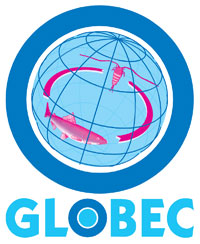
The World Climate Research Programme (WCRP) is an international programme that helps to coordinate global climate research. The WCRP was established in 1980, under the joint sponsorship of the World Meteorological Organization (WMO) and the International Council for Science (ICSU), and has also been sponsored by the Intergovernmental Oceanographic Commission (IOC) of UNESCO since 1993.
The Tropical Ocean Global Atmosphere program (TOGA) was a ten-year study (1985-1994) of the World Climate Research Programme (WCRP) aimed specifically at the prediction of climate phenomena on time scales of months to years.
CLIVAR is a component of the World Climate Research Programme. Its purpose is to describe and understand climate variability and predictability on seasonal to centennial time-scales, identify the physical processes responsible for climate change and develop modeling and predictive capabilities for climate modelling.
The World Ocean Database Project, or WOD, is a project established by the Intergovernmental Oceanographic Commission (IOC). The project leader is Sydney Levitus who is director of the International Council for Science (ICSU) World Data Center (WDC) for Oceanography, Silver Spring. In recognition of the success of the IOC Global Oceanographic Data Archaeological and Rescue Project, a proposal was presented at the 16th Session of the Committee on International Oceanographic Data and Information Exchange (IODE), which was held in Lisbon, Portugal, in October–November 2000, to establish the World Ocean Database Project. This project is intended to stimulate international exchange of modern oceanographic data and encourage the development of regional oceanographic databases as well as the implementation of regional quality control procedures. This new Project was endorsed by the IODE at the conclusion of the Portugal meeting, and the IOC subsequently approved this project in June 2001.
The Surface Ocean Lower Atmosphere Study (SOLAS) is a global and multidisciplinary research project dedicated to understanding the key biogeochemical-physical interactions and feedbacks between the ocean and the atmosphere. Further, SOLAS seeks to link ocean-atmosphere interactions with climate and people. Achievements of these goals are essential in order to understand and quantify the role that ocean-atmosphere interactions play in the regulation of climate and global change.
The Global Climate Observing System (GCOS) was established in 1992 as an outcome of the Second World Climate Conference, to ensure that the observations and information needed to address climate-related issues are obtained and made available to all potential users. The GCOS is co-sponsored by the World Meteorological Organization (WMO), the Intergovernmental Oceanographic Commission (IOC) of UNESCO, the United Nations Environment Programme (UNEP), and the International Council for Science (ICSU). In order to assess and monitor the adequacy of in-situ observation networks as well as satellite-based observing systems, GCOS regularly reports on the adequacy of the current climate observing system to the United Nations Framework Convention on Climate Change (UNFCCC), and thereby identifies the needs of the current climate observing system.
The World Ocean Circulation Experiment (WOCE) was a component of the international World Climate Research Program, and aimed to establish the role of the World Ocean in the Earth's climate system. WOCE's field phase ran between 1990 and 1998, and was followed by an analysis and modeling phase that ran until 2002. When the WOCE was conceived, there were three main motivations for its creation. The first of these is the inadequate coverage of the World Ocean, specifically in the Southern Hemisphere. Data was also much more sparse during the winter months than the summer months, and there was—and still to some extent—a critical need for data covering all seasons. Secondly, the data that did exist was not initially collected for studying ocean circulation and was not well suited for model comparison. Lastly, there were concerns involving the accuracy and reliability of some measurements. The WOCE was meant to address these problems by providing new data collected in ways designed to "meet the needs of global circulation models for climate prediction."

Global Ocean Ecosystem Dynamics (GLOBEC) is the International Geosphere-Biosphere Programme (IGBP) core project responsible for understanding how global change will affect the abundance, diversity and productivity of marine populations. The programme was initiated by SCOR and the IOC of UNESCO in 1991, to understand how global change will affect the abundance, diversity and productivity of marine populations comprising a major component of oceanic ecosystems.

The International Geosphere-Biosphere Programme (IGBP) was a research programme that ran from 1987 to 2015 dedicated to studying the phenomenon of global change. Its primary focus was coordinating "international research on global-scale and regional-scale interactions between Earth's biological, chemical and physical processes and their interactions with human systems."
GEOTRACES is an international research programme that aims to improve an understanding of biogeochemical cycles in the oceans.
IMBeR is a Future Earth-SCOR sponsored international project that promotes integrated marine research through a range of research topics towards sustainable, productive and healthy oceans at a time of global change, for the benefit of society.
The Partnership for Observation of the Global Ocean (POGO), which was founded in 1999, is a consortium of major oceanographic institutions around the world, represented by their Directors. POGO's goal is to promote global operational oceanography, the implementation of a Global Ocean Observing System, and the importance of ocean observations for society. In 2020, POGO had 51 Members. The current Chairman (2019-2022) is Prof. Nick Owens (Scottish Association for Marine Science, UK).
Syed Wajih Ahmad Naqvi is an Indian marine scientist and the former director of the National Institute of Oceanography. His work has concentrated in oceanic water chemistry, biogeochemistry, and chemical interrelations with living organisms. He has also performed research on freshwater ecosystems. He was the chief Indian scientist of LOHAFEX, an ocean iron fertilization experiment jointly planned by the Council of Scientific Industrial Research (CSIR), India, and Helmholtz Foundation, Germany.
The North Pacific Marine Science Organization, also called PICES, is an intergovernmental organization that promotes and coordinates marine scientific research in the North Pacific Ocean and provides a mechanism for information and data exchange among scientists in its member countries.
Future Earth is an international research program which aims to build knowledge about the environmental and human aspects of Global change, and to find solutions for sustainable development. It aims to increase the impact of scientific research on sustainable development.
Meinrat O. Andreae, born in 1949 in Augsburg, is a German biogeochemist. Since 1987, he has worked as Director and Scientific Member at the Max Planck Institute for Chemistry (MPIC) in Mainz.
Gerold Siedler is a German physical oceanographer. He is professor emeritus at the Christian-Albrechts University of Kiel and at the GEOMAR Helmholtz Centre for Ocean Research Kiel.
Sunil Kumar Singh is a leading Indian geochemist, a former professor at the Physical Research Laboratory and currently the director of the National Institute of Oceanography, India. He is known for his studies on low temperature elemental and isotope geochemistry and his researches are reported to have assisted in widening the understanding of the evolution of the Himalayas. His studies have been documented in several peer-reviewed articles; Google Scholar, an online repository of scientific articles, has listed 99 of them respectively.
The Joint Global Ocean Flux Study (JGOFS) was an international research programme on the fluxes of carbon between the atmosphere and ocean, and within the ocean interior. Initiated by the Scientific Committee on Oceanic Research (SCOR), the programme ran from 1987 through to 2003, and became one of the early core projects of the International Geosphere-Biosphere Programme (IGBP).
Zanna Chase is an ocean-going professor of chemical oceanography and paleoceanography at the Institute of Marine and Antarctic Science, University of Tasmania, Australia. She has undertaken over 20 voyages on research vessels, and her areas of expertise are Antartic paleoclimate, marine carbon cycle, radionuclides in the ocean, sediment geochemistry, paleoceanography, and marine biogeochemistry. In 2013 she was awarded with an ARC Future Fellowship.



